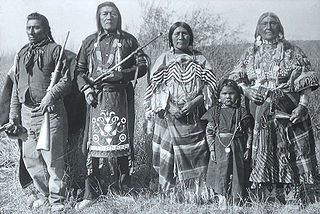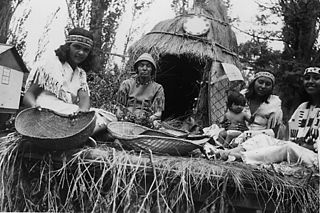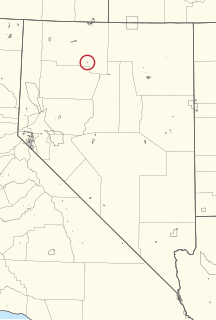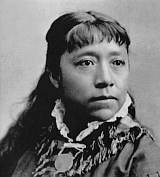The Shoshone or Shoshoni are a Native American tribe with four large cultural/linguistic divisions:

The Indigenous peoples of the Great Basin are Native Americans of the northern Great Basin, Snake River Plain, and upper Colorado River basin. The "Great Basin" is a cultural classification of indigenous peoples of the Americas and a cultural region located between the Rocky Mountains and the Sierra Nevada, in what is now Nevada, and parts of Oregon, California, Idaho, Wyoming, and Utah. The Great Basin region at the time of European contact was ~400,000 sq mi (1,000,000 km2). There is very little precipitation in the Great Basin area which affects the lifestyles and cultures of the inhabitants.

The Bannock tribe were originally Northern Paiute but are more culturally affiliated with the Northern Shoshone. They are in the Great Basin classification of Indigenous People. Their traditional lands include northern Nevada, southeastern Oregon, southern Idaho, and western Wyoming. Today they are enrolled in the federally recognized Shoshone-Bannock Tribes of the Fort Hall Reservation of Idaho, located on the Fort Hall Indian Reservation.

The Mono are a Native American people who traditionally live in the central Sierra Nevada, the Eastern Sierra, the Mono Basin, and adjacent areas of the Great Basin. They are often grouped under the historical label "Paiute" together with the Northern Paiute and Southern Paiute - but these three groups, although related within the Numic group of Uto-Aztecan languages, do not form a single, unique, unified group of Great Basin tribes.
The Big Pine Band of Owens Valley Paiute Shoshone Indians of the Big Pine Reservation are a federally recognized tribe of Mono and Timbisha Indians in California.
The Cold Springs Rancheria of Mono Indians of California is a federally recognized tribe of Mono Native Americans. Cold Springs Rancheria is the tribe's reservation, which is located in Fresno County, California. As of the 2010 Census the population was 184.

The Bridgeport Indian Colony of California, formerly known as the "Bridgeport Paiute Indian Colony of California", is a federally recognized tribe of Northern Paiute Indians in Mono County, California, United States.
The Lovelock Paiute Tribe of the Lovelock Indian Colony is a federally recognized tribe of Northern Paiute Indians in Pershing County, Nevada.

The Bishop Paiute Tribe, formerly known as the Paiute-Shoshone Indians of the Bishop Community of the Bishop Colony is a federally recognized tribe of Mono and Timbisha Indians of the Owens Valley, in Inyo County of eastern California. As of the 2010 Census the population was 1,588.
The Paiute-Shoshone Indians of the Lone Pine Community of the Lone Pine Reservation is a federally recognized tribe of Mono and Timbisha Native American Indians near Lone Pine in Inyo County, California. They are related to the Owens Valley Paiute.

The Summit Lake Paiute Tribe of Nevada is a federally recognized tribe of Northern Paiute Indians in northwest Nevada. Their autonym in their language is Agai Panina Ticutta, meaning "Fish Lake Eaters." They are traditionally known as the "Fish Eaters."

The Winnemucca Indian Colony of Nevada is a federally recognized tribe of Western Shoshone and Northern Paiute Indians in northwestern Nevada.

The Yerington Paiute Tribe of the Yerington Colony and Campbell Ranch is a federally recognized tribe of Northern Paiute Indians in western Nevada.
The Paiute Indian Tribe of Utah is a federally recognized tribe of Southern Paiute and Ute Indians in southwestern Utah.

The Las Vegas Tribe of Paiute Indians of the Las Vegas Indian Colony is a federally recognized tribe of Southern Paiute Indians in Southern Nevada.

The San Juan Southern Paiute Tribe of Arizona is a federally recognized tribe of Southern Paiute Indians in Coconino County, Arizona.

The Te-Moak Tribe of Western Shoshone Indians of Nevada is a federally recognized tribe of Western Shoshone Indians in northeastern Nevada.

The Duckwater Shoshone Tribe of the Duckwater Reservation is a federally recognized tribe of Western Shoshone, based in central Nevada in the high desert Railroad Valley, in northern Nye County. Their autonym is Tsaidüka in their Shoshoni language, meaning "Eaters of tule."
The Fort Independence Indian Community of Paiute Indians of the Fort Independence Reservation is a federally recognized tribe of Paiute and Shoshone people in the Owens Valley, in Inyo County, eastern California. As of the 2010 Census the population was 93.

The Fort McDermitt Paiute and Shoshone Tribe is a federally recognized tribe of Northern Paiute and Western Shoshone peoples, whose reservation Fort McDermitt Paiute and Shoshone Tribes of the Fort McDermitt Indian Reservation spans the Nevada and Oregon border next to Idaho. The reservation has 16,354 acres (6,618 ha) in Nevada and 19,000 acres (7,700 ha) in Oregon.














